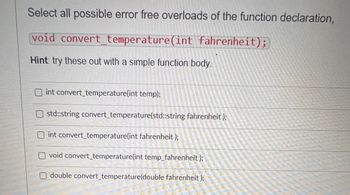Question

Transcribed Image Text:Select all possible error free overloads of the function declaration,
void convert_temperature(int fahrenheit);
Hint: try these out with a simple function body.
int convert_temperature(int temp);
std::string convert_temperature(std::string fahrenheit);
int convert_temperature(int fahrenheit);
void convert_temperature(int temp_fahrenheit );
double convert_temperature(double fahrenheit);
Expert Solution
This question has been solved!
Explore an expertly crafted, step-by-step solution for a thorough understanding of key concepts.
Step by stepSolved in 3 steps

Knowledge Booster
Similar questions
- Can we use a function as a parameter of another function? [Eg: void wow(int func())].a) Yes, and we can use the function value convenientlyb) Yes, but we call the function again to get the value, not as convenient as in using variablec) No, C does not support itd) This case is compiler dependentarrow_forwardNote that you may not use any string methods (e.g., replace, find, index, etc.) when writing the functions for this question (with some exceptions, detailed below). These methods could let you very easily complete these functions, but the point of these functions is to gain expertise in writing code directly dealing with strings and loops. No marks will be given for a function which includes calls to string methods. KEEP IN MIND THE NOTE ABOVE PLEASE NO CALL TO THOSE FUNCTIONSarrow_forwardWrite a function which will swap its arguments if the first argument is greater than its second argument,but will not interchange them if the first argument is smaller than or equal to the second argument. Thefunction should return 1 if a swap was made, and 0 otherwise.(Hint: Make sure to use call by reference.)Write also a short test driver(i.e. a main() invoking your function). C++arrow_forward
- Write a function CountEvens() that has four integer parameters, and returns the count of parameters where the value is an even number (i.e. evenly divisible by 2) in c++arrow_forwardIn C++, m%n is the remainder when the integer m is divided by the integer n. We can define a function to test whether an integer is even as follows: bool even(int k) { if ( k % 2 == 1 ) return false; else return true;} Translate this function into a standard mathematical function specification.arrow_forwardPlease tell me where I get wrong.arrow_forward
- Write a function definition called AddPoints that has one integer parameter called points & the function returns an integer. (in C). Inside the function, declare, ask, & get an integer from the user (the bonus points), add the bonus points to points thst are copied into the function & return the sum.arrow_forwardFor parameter passing, call by constant reference is for the function if the value of the actual parameter isn't changed and does no copying. Group of answer choices True Falsearrow_forwardThe C Programming Language for prime tester Take a number from the command line. Do error checking. If the number is prime, output "the number <> is prime." If it is not prime, output the factors ("the number <> has the factors <>, <>, <>, <>") 10 - proper functioning 10 - style (esp good naming and breakdown to functions)arrow_forward
- Write a function named product that takes two int parameters and returns the product of those two integers. Here is an example: int n = product(7, 5); // n is 35 We are providing a test framework that, if you wish, you may use with a compiler to test your function. What you will submit as your answer to this problem is only the product function. Do not submit things like the #include lines or a main routine. If we take the code you write in the space below and insert it into the program, the resulting program must build without compilation errors (mere warnings are allowed). You do not need to write comments in the code; we will not look at any comments. Here is the test framework that you may copy and paste into a C++ source file. For your own testing purposes, you might add additional tests in the main routine, although you won't be turning them in, of course. #include <iostream> #include <cassert> using namespace std; // SUBMIT AS YOUR ANSWER ONLY THE CODE BETWEEN THIS…arrow_forwardWhat is the problem with the definition of the following function that calculates and returns the tax due on a purchase amount? double tax_due (double amount, double tax_rate) { } double tax_due = 0.0; tax_due = amount * tax__rate; The tax_due function does not compile. The data type of the input parameters is incorrect. The tax_due calculation is incorrect. The tax_due function does not return a value.arrow_forwardplease see attached files below C++arrow_forward
arrow_back_ios
arrow_forward_ios